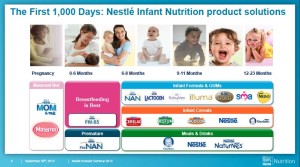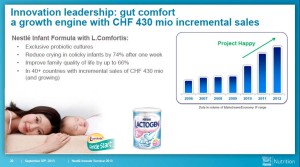Nestlé 1000 Days initiative aims to boost formula sales
Nestlé held its Creating Shared Value (CSV) Global Forum in Colombia on Monday 28 October 2013, opened by the President of Colombia and Nestlé Chairman, Peter Brabeck-Letmathé, who arrived together.
As luck would have it, International Nestlé-Free Week started the same day as the Forum. The week is a time for people who boycott Nestlé over the way it pushes baby milk to do more to promote the boycott – and for those who don’t boycott to give it a go. Which meant that Nestlé’s twitter feed from the Global Forum became a channel for exposing its marketing malpractice.
The academic Michael E. Porter of Harvard Business School (and advisor to UK Labour Party leader, Ed Miliband) summed up CSV in Global Forum soundbite: ‘When business can address social issues with a business model we have the magic.’
By ‘magic’ he means that if a company finds a way to make a profit from addressing a social issue it will invest to make money. If an initiative requires public money, then the more it grows the more governments have to put into funding it.
One of Nestlé’s Directors, Ann Veneman spoke on the 1000 Days concept (she was billed as former UNICEF Director, with no mention that she now works for Nestlé).
Publicly Nestlé says it is supporting health education on the importance of good nutrition in the 1000 Days from conception to two years old. What it tells investors is it has products to sell throughout the period: milks for mothers, formulas and growing up milks.
The slides above and below are from a Nestlé presentation to investors on 30 September 2013 (click on the images for larger versions). As part of its 1000 Days initiative, Nestlé pushes its formula with ‘gentle start’ claims in its ‘Project Happy’, which it boasts has been delivering strong sales growth (see pg 28 for Nestlé formula claims).
These CSV events help Mr Brabeck meet and influence policy makers. President Santos of Colombia announced at the Forum that he would be working on a free-trade agreement to make Colombia a major milk exporter and said he looked forward to working together with Nestlé in this area.
Action on Nestlé human rights abuses in Colombia
The European Center for Constitutional and Human Rights (ECCHR) is pursuing Nestlé through the Swiss courts in the case of trade unionist Luciano Romero, murdered by paramilitaries in 2005.On 9 January 2014 it said:
The murder of another Nestlé-worker and trade unionist in Colombia in November 2013 clearly demonstrates that the position of Nestlé towards its trade unionists has not changed….This recent murder was again preceded by defamations through the Colombian Nestlé management. Contrary to statements made on the company’s website and during conferences, Nestlé has clearly not yet adopted an approach to dealing with its workers and trade unionists, which does not present a danger to their lives.
Nestlé’s human rights white paper (pg 27) includes a case study on Colombia that makes no mention of the above or other cases (see past Updates).


